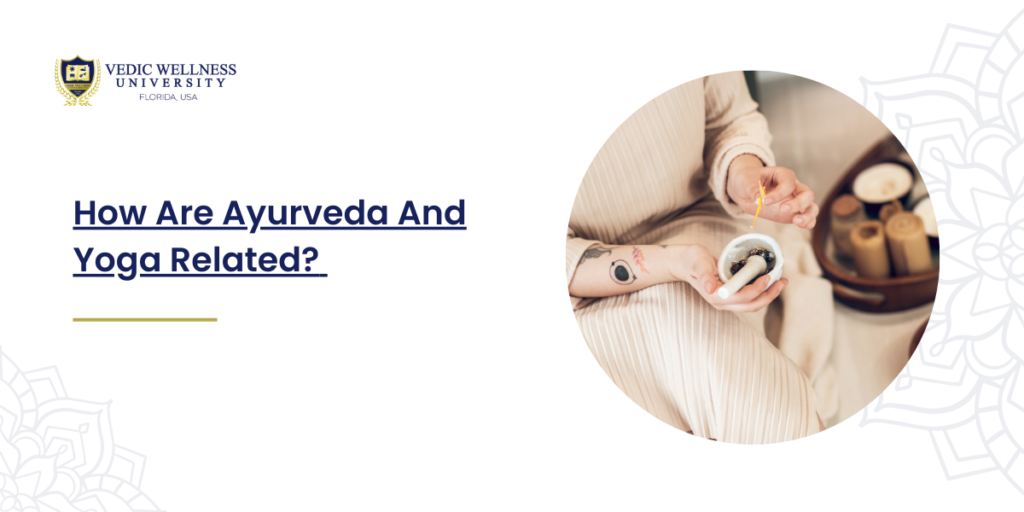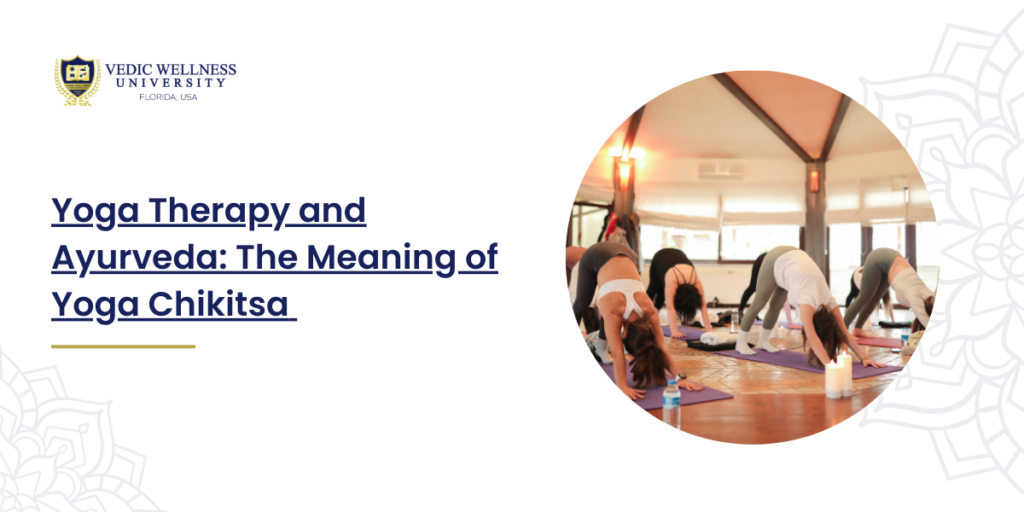How are Ayurveda and Yoga Related

धन्यास्ते यो योगेन जीवनं परिपालयन्ति। स्वशरीरं शरीरं च सृष्टेः स्वात्मनः संस्थानं। (Dhanyaste Yo Yogena Jeevanam Paripalayanti, Swasariram Shariram Cha Srishtheh Swatmanah Sansthanam.) “Blessed are those who sustain their lives through Yoga, recognizing the body as the abode of the soul.” – Hatha Yoga Pradipika Introduction Ayurveda and Yoga are two interconnected branches of ancient Indian wisdom that provide a comprehensive and holistic approach to health and well-being. Both sciences, rooted in the Vedic tradition, focus on harmonizing the body, mind, and spirit to achieve a state of balance and wellness. While Yoga primarily emphasizes physical postures, breathing exercises, and meditation to promote spiritual and mental health, Ayurveda is the science of life that focuses on maintaining balance in the body through diet, lifestyle, and herbal remedies. In recent years, the international community has shown a growing interest in these ancient practices, recognizing the benefits of integrating yoga and ayurveda for holistic health. This blog explores the profound relationship between yoga and ayurveda, detailing their principles, categorizations, and how they work together to foster overall well-being. Understanding Ayurveda: The Science of Life Ayurveda, which translates to “the science of life,” is a 5,000-year-old system of natural healing that originated in India. It is based on the principle that health and wellness depend on a delicate balance between the mind, body, and spirit. Ayurveda is not just about treating diseases; it is a way of life that promotes longevity, vitality, and spiritual awareness. Basic Principles of Ayurveda These principles lay the foundation for integrating Ayurveda with Yoga, as both systems aim to balance the body’s energies and promote holistic health. Yoga: The Path to Union Yoga, which means “union,” is a spiritual and physical discipline that integrates the body, mind, and spirit. It encompasses a range of practices, including physical postures (asanas), breath control (pranayama), meditation (dhyana), and ethical principles (yamas and niyamas). Yoga is not merely a physical exercise; it is a path to self-realization and spiritual growth. Key Aspects of Yoga and Their Connection to Ayurveda By combining these aspects, yoga and ayurveda provide a comprehensive approach to wellness that addresses the physical, mental, and spiritual dimensions of health. The Interconnection of Ayurveda and Yoga Yoga and Ayurveda are often referred to as “sister sciences” because they both originate from the Vedic tradition and share a common goal—achieving harmony and balance in life. When integrated, these two sciences offer a more profound path to healing and self-realization. How Yoga and Ayurveda Complement Each Other Categories of Integrative Yoga and Ayurveda Practices Combining yoga and ayurveda offers a variety of practices that can be tailored to individual needs. These practices are categorized based on their objectives and the specific dosha they target. 1. Vata-Pacifying Yoga and Ayurveda Practices: 2. Pitta-Balancing Yoga and Ayurveda Practices: 3. Kapha-Reducing Yoga and Ayurveda Practices: By following these integrative practices, individuals can experience the full spectrum of benefits that yoga and ayurveda have to offer. Vedic Wellness University: Promoting Yoga and Ayurveda for Holistic Wellness Vedic Wellness University (VWU) is at the forefront of promoting the integration of yoga and ayurveda as essential components of holistic wellness education. VWU offers a wide range of courses designed to cater to students from around the world, making ancient Vedic knowledge accessible to everyone.
Yoga Therapy and Ayurveda The Meaning of Yoga Chikitsa

क्ताहारविहारस्य युक्तचेष्टस्य कर्मसु। युक्तस्वप्नावबोधस्य योगो भवति दुःखहा।। (Yuktahara Viharasya Yuktacheshtasya Karmasu, Yuktasvapnavabodhasya Yogo Bhavati Duhkhaha.) “For one who is moderate in eating and recreation, balanced in work and regulated in sleep, Yoga destroys all sorrow.” – Bhagavad Gita 6.17 Introduction Yoga and Ayurveda are two interconnected branches of ancient Indian wisdom that provide a holistic approach to health and well-being. In recent years, there has been a growing global interest in these ancient sciences as more people seek natural ways to achieve balance and harmony in their lives. Central to this holistic approach is Yoga Therapy, known in Sanskrit as Yoga Chikitsa. This blog will explore the meaning of Yoga Therapy, its benefits, and its integration with Ayurveda to provide a comprehensive understanding of health. Yoga Therapy focuses on using yoga practices as a therapeutic tool to address physical, mental, and emotional imbalances. When combined with Ayurveda, the science of life, it creates a powerful synergy that promotes healing and well-being. This blog will delve into the benefits of yoga therapy, provide a detailed yoga therapy definition, and highlight the health benefits of yoga as understood through the lens of Ayurveda. The Principles of Ayurveda and Their Connection to Yoga Therapy Ayurveda, the ancient Indian system of medicine, is based on the principles of balance and harmony within the body, mind, and spirit. According to Ayurveda, health is achieved when there is a balance between the three fundamental energies or Doshas—Vata (air and space), Pitta (fire and water), and Kapha (water and earth). An imbalance in these doshas leads to illness, and the goal of Ayurvedic practices, including Yoga Therapy, is to restore balance. Basic Principles of Ayurveda and Their Relevance to Yoga Therapy By integrating these principles, Yoga Therapy serves as a bridge that connects physical health with mental and spiritual wellness, providing a holistic approach to healing. Understanding Yoga Therapy: Definition and Benefits Yoga Therapy is a specialized field within the broader discipline of yoga that focuses on adapting traditional yoga practices to address specific health conditions. Unlike general yoga classes, Yoga Therapy is individualized, taking into account a person’s physical, mental, and emotional needs. The aim is to use yoga as a therapeutic intervention to promote healing, prevent illness, and enhance overall well-being. Yoga Therapy Definition and Its Unique Approach Health Benefits of Yoga Therapy The health benefits of yoga are well-documented and cover a wide range of physical, mental, and emotional aspects. Categories of Yoga Therapy Practices in Ayurveda Yoga Therapy can be broadly categorized into several types based on the goals of the practice and the specific needs of the individual. These categories help practitioners understand how to tailor their approach for maximum benefit. 1. Therapeutic Yoga for Physical Health: 2. Breathwork and Pranayama for Respiratory Health: 3. Meditation and Mindfulness for Mental Health: 4. Integrative Therapy for Holistic Health: Vedic Wellness University: Promoting Yoga Therapy and Ayurveda Vedic Wellness University (VWU) is at the forefront of promoting Yoga Therapy and Ayurveda as essential components of holistic wellness education. With a focus on integrating ancient Vedic knowledge with modern practices, VWU offers a wide range of courses that cater to students from around the globe. Courses Offered by Vedic Wellness University How to Enroll in Vedic Wellness University Courses Interested students can visit the VWU website, explore the courses, and select the program that best suits their interests and career goals. With a user-friendly enrollment process, flexible learning schedules, and access to expert faculty, VWU ensures a seamless educational experience for all its students. Conclusion Yoga Therapy and Ayurveda, with their deep roots in ancient Indian philosophy, offer a comprehensive approach to health and wellness that is both timeless and relevant. As the world moves towards natural and holistic methods of healing, the significance of Yoga Therapy is becoming more widely recognized. By understanding the yoga therapy definition and its integration with Ayurveda, individuals can harness the full potential of these ancient sciences to achieve balance, harmony, and well-being. Vedic Wellness University is dedicated to spreading this ancient wisdom through its diverse range of courses, making

